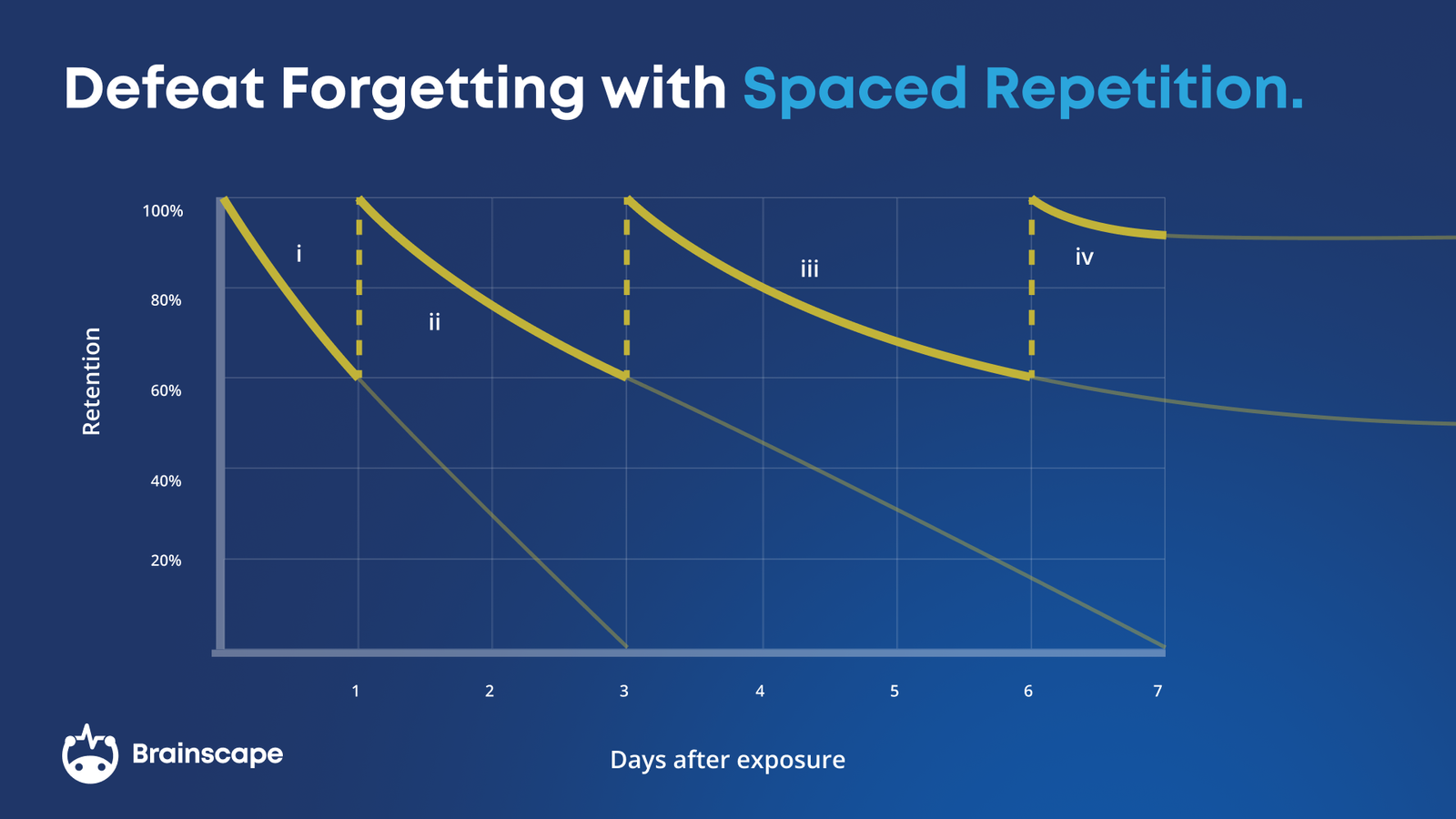There’s an old Latin phrase that sums up one of the most timeless truths in education: Repetitio mater studiorum est.
Translation? “Repetition is the mother of all learning.”
And honestly? It still slaps.
It turns out, all that time you spent chanting vocabulary, reworking formulas, or practicing your signature in middle school wasn’t just busy work—it was your brain doing what it does best: locking in knowledge through repeated exposure.
But let’s be real—repetition alone isn’t enough. It’s not about grinding out the same flashcard over and over until your eyes glaze. It’s about smart repetition. The kind of repetition that adapts to you. The kind that’s...well, built into Brainscape. But we’ll get to that in a second.
The Science Behind Repetition
When scientists studied how people remember stuff, they found a pretty consistent pattern: we forget things over time unless we actively revisit them. That’s why repetition is so crucial. Every time you review a piece of information, it reinforces that memory trace and makes it stronger. Think of it like lifting a weight—each repetition makes your “knowledge muscles” a little more buff.

But there’s a catch: not all repetition is created equal. Mindless rereading? Meh. Highlighting a paragraph ten times? Pretty but ineffective. The real magic happens when you’re using spaced repetition: the practice of reviewing information at just the right intervals, spaced out over time. That way, you hit your brain with a little refresher right before it forgets something. Perfect timing = maximum retention.
Repetition and Language Learning
Want to learn a new language? Repetition isn’t optional—it’s essential. Languages are massive collections of patterns, sounds, and rules, and your brain needs frequent exposure to commit those to memory. The good news? You’re never too old to do it.

In fact, adults may even have the upper hand over kids when it comes to learning a second language. Why? Because we’re better at using tools and strategies to learn deliberately. Repeating a vocab word isn’t just about saying it ten times—it’s about pulling it from memory, using it in a sentence, hearing it in context, and seeing it again a few days later.
That’s where Brainscape comes in.
How Brainscape Makes Repetition Smarter
Brainscape is a web and mobile flashcard app designed to help you learn faster and remember longer—by using science. At its core is confidence-based repetition, a system that adapts to how well you know each concept. When you rate your confidence after seeing a flashcard, the app figures out when to show it again based on how well you know it.

Struggling with a fact? You’ll see it more often. Already know it? It’ll fade into the background until it’s time for a gentle reminder. This adaptive approach helps you focus on what you don’t know without wasting time on what you already do. It’s like personalized studying with a superpower.
Plus, Brainscape comes with a HUGE library of certified flashcards designed by subject matter experts. Whether you’re tackling AP exams, learning Spanish, memorizing medical terms, or brushing up on trivia for your next pub quiz, Brainscape’s spaced repetition engine ensures that your study time actually works.
FAQ: Does Learning by Repetition Work?
How effective is repetition in learning?
Repetition is one of the most powerful tools for reinforcing memory. By revisiting information over time, especially when spaced strategically, you strengthen the neural connections that store knowledge, making it easier to retrieve later.
Does the brain learn through repetition?
Absolutely. The brain solidifies new information through repeated exposure. Each repetition reinforces memory pathways, helping transform short-term knowledge into long-term understanding.
What are the disadvantages of repetitive learning?
Not all repetition is helpful. Passive repetition, like rereading notes or mindlessly highlighting, can lead to boredom and false confidence. Without active engagement, repetition loses its effectiveness and becomes a time sink.
Is repetition the best way to memorize?
Repetition is essential, but it’s most effective when paired with techniques like active recall and conducted as deliberate spaced repetition. These methods make repetition dynamic and targeted, leading to better memorization with less effort.
Final Thoughts: Make Repetition Work for You
Repetition isn’t just a throwback to your school days—it’s the backbone of effective learning at any age. But the key is intentional repetition. Spaced out. Adapted to your brain. Delivered just when you need it most.
Brainscape makes that easy, fun, and effective. Instead of wasting hours with ineffective review, you can chip away at your goals in small, powerful bursts—whether you're on the couch, in a coffee shop, or waiting for your Pop-Tart to pop.
So yes, repetition works. But smart repetition works wonders. And now you’ve got the tools to make it happen.
Additional Reading
- The science of never forgetting: Spaced repetition for fast learning that lasts
- Learn Deliberately to Learn Faster
- The Secret to Learning More While Studying Less: Adaptive Learning
References
Bruner, R. F. (2001). Repetition is the First Principle of All Learning. SSRN Electronic Journal. https://papers.ssrn.com/sol3/Delivery.cfm/SSRN_ID224340_code010826100.pdf?abstractid=224340&mirid=1
Pan, S. C. (2024). Retrieval practice. UC San Diego Department of Psychology. https://psychology.ucsd.edu/undergraduate-program/undergraduate-resources/academic-writing-resources/effective-studying/retrieval-practice.html
Smith, C. D., & Scarf, D. (2017). Spacing repetitions over long timescales: A review and a reconsolidation explanation. Frontiers in Psychology, 8. https://doi.org/10.3389/fpsyg.2017.00962
Yuan, X. (2022). Evidence of the spacing effect and influences on perceptions of learning and science curricula. Curēus. https://doi.org/10.7759/cureus.21201
